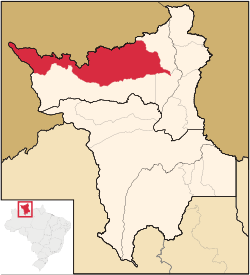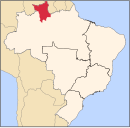Amajari
Amajari | |
|---|---|
| The Municipality of Amajari | |
 Paiva waterfall | |
 Flag  Seal | |
 Location of Amajari in the State of Roraima | |
| Coordinates: 03°39′07″N 61°22′15″W / 3.65194°N 61.37083°WCoordinates: 03°39′07″N 61°22′15″W / 3.65194°N 61.37083°W | |
| Country | |
| Region | North |
| State | |
| Founded | 17 October 1995 |
| Government | |
| • Mayor | Vera Lúcia (PSC) |
| Area | |
| • Total | 28,472 km2 (10,993 sq mi) |
| Elevation | 100 m (300 ft) |
| Population (2020 [1]) | |
| • Total | 13,185 |
| • Density | 0.21/km2 (0.5/sq mi) |
| Time zone | UTC-4 |
| HDI (2000) | 0.654 – medium[2] |
| Website | amajari.rr.gov.br |
Amajari (Portuguese pronunciation: [ɐmaʒaˈɾi]) is a municipality located in the northwest of the state of Roraima in Brazil. Its population is 13,185 and its area is 28,472 km². It is the westernmost municipality in Roraima.
The municipality of Amajari is a region of 8 indigenous segments with a total of 19 indigenous communities living there. The present ethnic groups are the Macuxi, Wapichana, and Taurepang people. The 8 indigenous segments: TI Araçá, TI Ouro, TI Anaro, TI Ponta da Serra, TI Aningal, TI Garagem, TI Santa Inês and TI Ananás. The indigenous communities that are located in the region are: Araçá, Mutamba, Mangueira, Três Corações, Guariba, Anaro, Ponta da Serra, Urucuri, Juraci, Nova União, Ouro, San Francisco, Cajueiro, Garagem, Ananás, Leão de Ouro, Santa Inês, Aningal and Vida Nova.
Main townships[]
The following is a list of the main populated places within the municipality and their population according to the census of 2010.[3]
- 1,219 inhabitants - Vila Brasil
- 116 inhabitants - Vila Tepequém
- 587 inhabitants - Vila Três Corações
- 693 inhabitants - Vila do Trairão
Notable people[]
- Suely Campos (1953), politician and former governor of Roraima[4]
References[]
- ^ IBGE 2020
- ^ "Archived copy". Archived from the original on 2009-10-03. Retrieved 2009-12-17.
{{cite web}}: CS1 maint: archived copy as title (link) - UNDP - ^ Instituto Brasileiro de Geografia e Estatística (IBGE) (16 November 2011). "Sinopse por setores". Retrieved 7 April 2021.
- ^ "Maria Sueli Silva Campos". Centro de Pesquisa e Documentação de História Contemporânea do Brasil via Archive.org (in Portuguese). Retrieved 15 April 2021.
External links[]
- Official site (in Portuguese)
 Media related to Amajari at Wikimedia Commons
Media related to Amajari at Wikimedia Commons
- Municipalities in Roraima
- Populated places established in 1995
- Roraima geography stubs


